

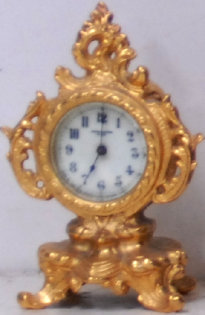
214. $50
“S. C. Spring / Bristol, Conn.”, miniature shelf clock, ca 1858.
Later went into business with Elisha Welch. This rosewood veneered case is 11 inches high, has half columns on the front, painted
black and there are other black painted areas. Good old door glasses, painted dial and complete paper label. The movement is one day
time only and running. $75-$150.
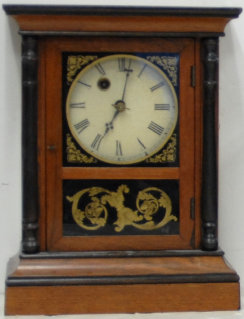
215. $25
New Haven Clock Co. novelty dresser clock, standing 6 inches high.
About as perfect as you will ever see, EXCEPT I cannot make it run. It is so nice it does not appear to have ever had the back off.
I would bet if you take a few minutes and put a spot of oil here and there it will run. Perfect porcelain signed dial and hands. The
gold finish on the metal is near perfect. $25-$50.
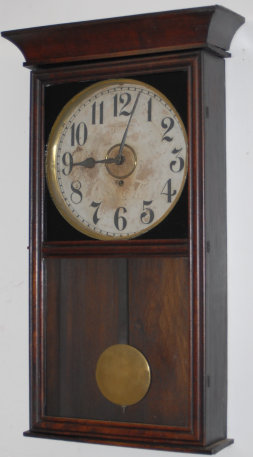
216. $100
Wm. L. Gilbert Clock Co. hanging clock, the “University”, ca
1913. Gilbert advertised this clock in their catalogs this way, “Gilbert’s No. 3022. (Code Word) University”. This style case is more
commonly called a “store regulator” or “shop clock”, for they were very inexpensive clocks when sold new, selling for around $7 or
less. Most were used in stores and shops as the synonyms imply. The case has dark original finish. It retains all the original wood
parts except for a trim piece on the base. The top glass is original the bottom is possibly a replacement. The dial is dirty
and worn. The movement is 8-day, time only, and running. The brass bob, wood stick, and winding key, are all correct for this model.
On the back of the case is a paper label. Ly-Gilbert #440. $150-$250.
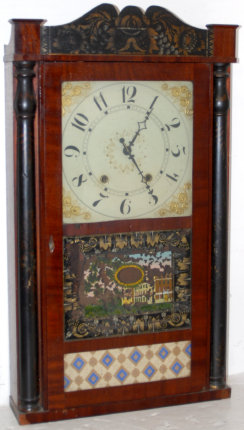
217. $150
“Eli Terry, Jr. / Terryville Connecticut”, copied from the practically
complete paper label inside this stenciled column and splat shelf clock, ca 1831. The mahogany veneered case is 31.5 inches tall and
the veneer is good all over. Well, it is over 185 years old, and I am sure there is a small veneer chip or two along the base if nowhere
else. This is his three-glass model making it a little different. The two big glasses are original and the small bottom glass has
a thin paper design and a backer board. It wasn’t put there yesterday, been there a long time. The chimneys, returns, pulleys, door
lock and other accessories are original but there is no escutcheon over the lock, and no key. The 30-hour movement has a 42-tooth
escape and runs. It has a very good wooden dial, old hands, old brass pendulum, and pair of iron weights. $150-$300.
218. $250
Eli Terry, Jr, Terryville, Conn. two door mahogany case with
half columns and splat, ca 1831. This clock is unusual because it has the very rare horse shoe eight-day movement and two sets of
double pulleys at top for compounded weights that is found only on Eli Terry, Jr. 8-day brass clocks. That is the good part of this
clock, now the not so good. There is a partial label indicating it was made by Eli Terry and made and sold in Terryville, Conn. There
are no weights or pendulum, splat may be a replacement, upper door has no lock, and hinges on lower door are replacements. Some
more good things; the wood dial is original, capitals and returns are original, wooden mounting block for bell is present, and there
are old fancy steel hands. Money to made here for your fixer up guys. $300-$500.
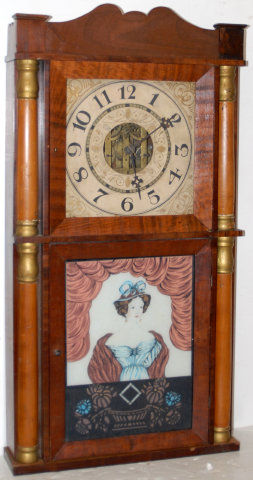
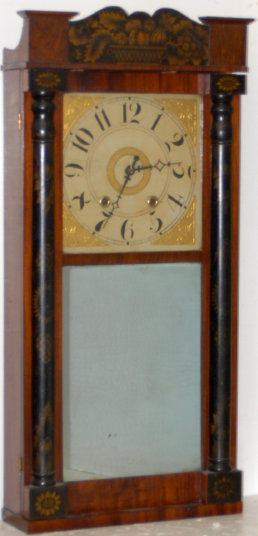
219. $125
“Jeromes & Darrow /Bristol, Connecticut”, makers of looking
glass wood movement clocks, ca 1828-1834. Chauncey Jerome made the case, brother Noble made the movement, and Elijah Darrow made the
tablets. This mahogany case has a full door with stenciled half columns and stenciled splat. The case is 35 inches tall, complete
and original including capitals and returns, pulleys, door lock with escutcheon, iron bell, old brass pendulum, great dial with trumpet
grommets similar to other Jerome clocks shown in the Ken Roberts book. It has an old mirror, old hands and a pair of iron weights.
The clock ticks and has not inner problems but I did not hang the weights. $150-$300.